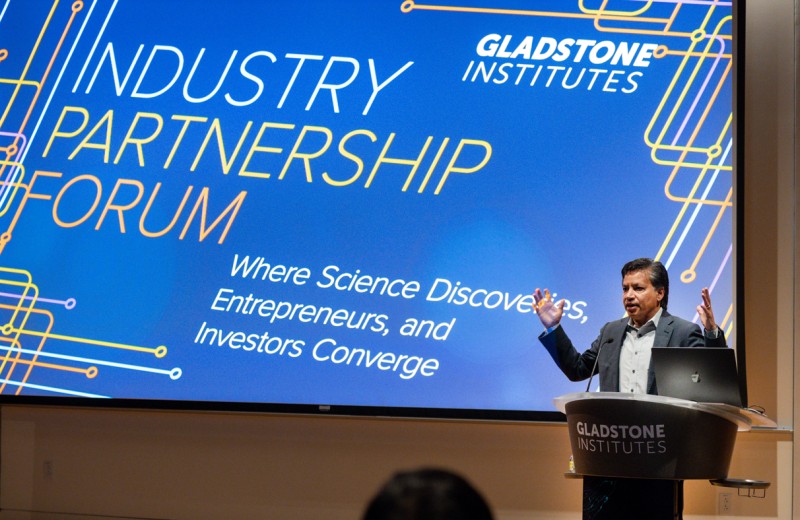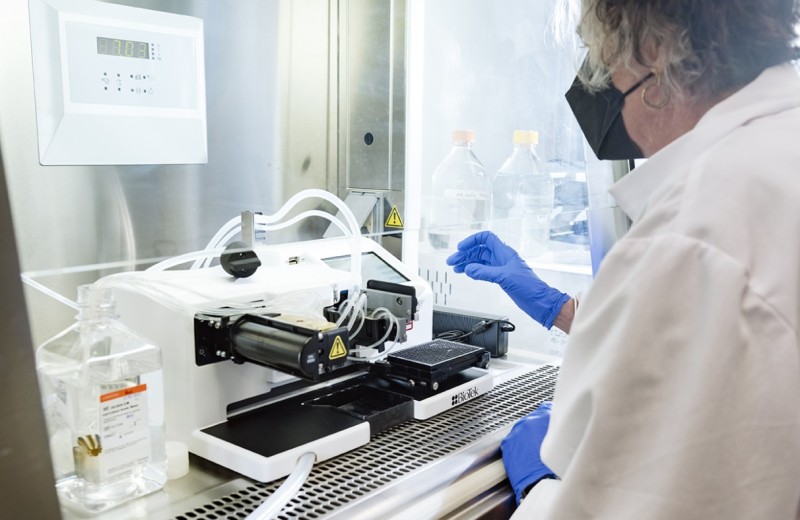Gladstone NOW: The Campaign Join Us on the Journey✕

Study will use innovative technologies developed by Gladstone's Steve Finkbeiner to focus on neurodegenerative diseases. [Photo: Gladstone Institutes]
The Gladstone Institutes announced today a new research collaboration with Eli Lilly and Company focused on neurodegenerative diseases. This multi-year, milestone-driven project will be based on a combination of innovative technologies developed at Gladstone by Steve Finkbeiner, MD, PhD. His laboratory will work closely with Lilly during this collaboration.
“This collaboration has high potential to open new avenues towards effective therapies for neurodegenerative diseases,” said Gladstone President R. Sanders Williams, MD. “Both organizations are committed to meeting this major unmet need.”
Key to the project is a robotic microscope system developed in Finkbeiner’s laboratory with funds from Gladstone, the Taube/Koret Center, and the ALS Association. This fully automated platform allows scientists to track thousands of individual cells for days or weeks at a time, and follow discrete cellular functions.
When coupled with neurons generated from induced pluripotent stem cells collected from patients with neurodegenerative diseases, such as Alzheimer’s disease, Parkinson’s disease, Huntington’s disease, and ALS, this microscope becomes a powerful tool to study the cells and their responses to disease and treatments.
“The microscope lets us examine cells on an individual basis, much as we would human patients,” said Finkbeiner, director of the Taube/Koret Center for Neurodegenerative Disease Research. “We can then use very sophisticated statistics to determine exactly how the cells are responding to different treatments.”
The robotic microscope integrates new biosensors—tools that illuminate hidden biology in live cells—and state-of-the-art imaging methods. The data analysis relies on special algorithms developed by Finkbeiner’s team, as well as deep machine–learning in which computing systems can uncover complex signals in images.
“Neurodegenerative diseases are some of the most pressing medical concerns today, and the prevalence of these diseases is growing as our population ages,” said Stephen B. Freedman, PhD, vice president of corporate liaison and ventures at Gladstone. “Lilly is a leader in this field, making them an ideal collaborator.”
For Media
Julie Langelier
Associate Director, Communications
415.734.5000
Email
About Gladstone Institutes
Gladstone Institutes is an independent, nonprofit life science research organization that uses visionary science and technology to overcome disease. Established in 1979, it is located in the epicenter of biomedical and technological innovation, in the Mission Bay neighborhood of San Francisco. Gladstone has created a research model that disrupts how science is done, funds big ideas, and attracts the brightest minds.
Support Discovery Science
Your gift to Gladstone will allow our researchers to pursue high-quality science, focus on disease, and train the next generation of scientific thought leaders.
Our San Francisco Location | The Gladstone Difference
Our San Francisco Location | The Gladstone Difference
Learn how Gladstone's location fosters enriching collaborations and partnerships.
Business Development Institutional NewsIndustry Partnership Forum Offers Insider Look at Scientific Breakthroughs from Gladstone
Industry Partnership Forum Offers Insider Look at Scientific Breakthroughs from Gladstone
The annual event hosted by Gladstone Institutes showcases its most promising scientific discoveries for interested investors and potential industry partners
Corporate Liaison and Ventures Business Development Institutional NewsCNDAP Partners with Takeda to Develop New Therapies for Alzheimer’s Disease and Related Brain Disorders
CNDAP Partners with Takeda to Develop New Therapies for Alzheimer’s Disease and Related Brain Disorders
A research collaboration to target the protein tau with small molecules
Business Development News Release Alzheimer’s Disease Neurological Disease Mucke Lab




